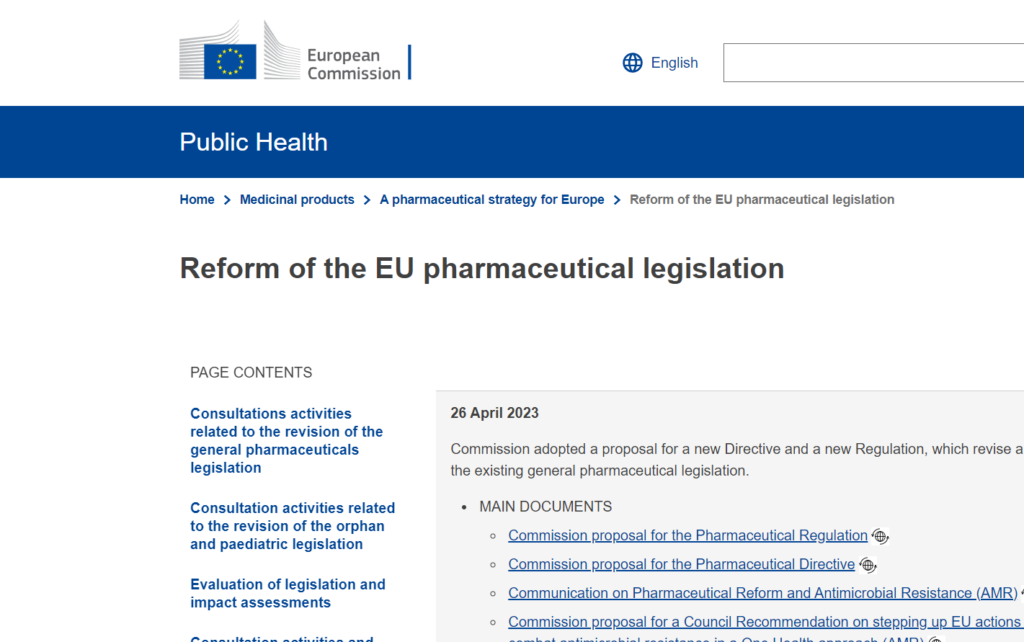Introduction
The European Union stands at the threshold of significant change with its proposed EU pharmaceutical legislation. This initiative, born from the challenges experienced during the COVID-19 pandemic, aims to revitalize the EU’s approach to healthcare, ensuring it’s better prepared for future crises and more responsive to the needs of its citizens. Panelists that spoke on the proposed EU Pharmaceutical legislation included:
- Gloria Ghequiere, Belgium Federal Government, Brussels, Belgium
- Neil Grubert, Independent, Basildon, United Kingdom
- Denis Lacombe, European Organisation for Research and Treatment of Cancer (EORTC), Brussels, Belgium
- Yannis Natsis, European Social Insurance Platform (ESIP), Brussels, Belgium
- Johan Pontén, Medicine Evaluation Committee (MEDEV), Stockholm, Sweden
The Core Pillars: The Three A’s & the Three S’s
The foundation of the legislation rests on the “three A’s” — affordability, accessibility, and availability. These pillars are designed to ensure that essential medicines are both economically and physically accessible to all EU residents, addressing long-standing disparities in healthcare. At the ISPOR conference in Copenhagen, experts proposed augmenting this framework with the “three S’s” — sustainability, solidarity, and social contract. This expansion seeks to embed mutual cooperation, and a reciprocal agreement between healthcare providers and the public into the fabric of healthcare policy.
Balancing Innovation and Affordability
One of the critical issues raised by panelists was the tension between encouraging pharmaceutical innovation and maintaining drug affordability. They noted the challenging dynamic of high-cost, low-evidence innovative medicines, stressing the need for evidence-based decision-making in pharmaceutical approvals. The panelists also pointed out the disparities in medicine availability across EU countries, with wealthier nations often stockpiling essential drugs, leading to shortages in less affluent member states. They advocated for stronger alliances and legislative measures to enforce equitable medicine distribution.
Inclusivity in Pharmaceutical Legislation
The legislation, as it stands, does not thoroughly address price control mechanisms or the market needs for affordability and competitiveness. The panelists also noted a significant investment focus on orphan and cancer drugs, sometimes at the expense of other vital healthcare areas. They called for more inclusive legislation that considers the diverse healthcare needs of the entire EU population. The discussion also emphasized a shift from focusing on specific unmet medical needs to a broader perspective that includes the majority’s healthcare requirements. This approach would ensure a more inclusive healthcare policy, providing optimal resources and treatment options for a larger segment of the population.
The Challenge of Regulatory Complexity
Panelists expressed concern about the multiple pathways for the approval of innovative medicines by the European Medicines Agency. They highlighted the need for a more streamlined, simplified process to facilitate quicker and more efficient access to new treatments. A specific challenge in oncology was discussed — the ‘double payment’ issue, where healthcare systems pay for expensive medicines and manage the toxicity related to these treatments. Optimizing dosing and treatment regimes was suggested as a potential solution to this problem.
Conclusion: A Balanced Approach to Healthcare
The EU’s pharmaceutical legislation reform represents a pivotal step towards a more balanced, inclusive, and sustainable healthcare system. This approach aims to integrate innovative treatments while ensuring they are accessible, affordable, and beneficial to all citizens.





